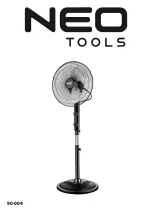
7
2
Important Information
2.1 S&P Safety Components
S&P fans are designed with redundant safety features to provide protection in the unlikely event of a catastrophic
failure. Follow installation instructions carefully when installing fans.
2.2 Fan Spacing’s and Placement
A standard ceiling fan should be mounted so that the bottom of the fans hub is 33 inches below the bottom of the
beam which it is mounted. Fan blades should be mounted between 10’ and 25’ above the floor with optimum height
between 15’-20’. If desired, extension bars are available to lower the fan if needed. Avoid mounting fans directly
below lights or skylights to avoid a strobe effect caused by the moving blades.
When mounting a fan in an area where objects may be lifted or moved into the path of the fan, S&P recommends
marking or painting hash lines on the floor to alert personnel of the above movement of the fan.
The area within 15% of the diameter when the fan is at rest is considered “close clearance”. It is extremely dangerous
to mount the fans within “close clearance” of any object or path of object. We strongly recommend not mounting the
fan closer than 15% of its diameter to any object or its path. If this is an issue, mounting extension bars and smaller
fans are available from S&P.
2.3 Fire Suppression Systems and Fan Placement
If installing Fans in a location where fire sprinklers are in place, do not interfere with their correct operation. Fans
should be located in the center of each sprinkler quadrant and no less than 3 feet below the sprinkler. Review all
codes applicable to sprinkler systems prior to installation; it is the customer’s responsibility to see that the installation
is completed to code and that it is correct.
2.4 Shielded Motor Cable
To minimize electromagnetic interference and stray voltage, S&P recommends the use of shielded input voltage
cable. This shielded system reduces the likelihood of broadcasting and receiving electronic noise which can interfere
with radio and other sensitive equipment. This shielded motor cable and the controller cable must be run in separate
conduit at least 6 inches apart. Electrical interference and stray voltages are the liability of the installer and are not
covered by S&P under warranty.
2.5 Check Compliance with Federal, State, and Local Codes
Check all relevant codes to make sure product certifications, product listings, and building regulations are met. Code
compliance is the responsibility of the installer.








































